Understanding Toddler Separation Anxiety At School
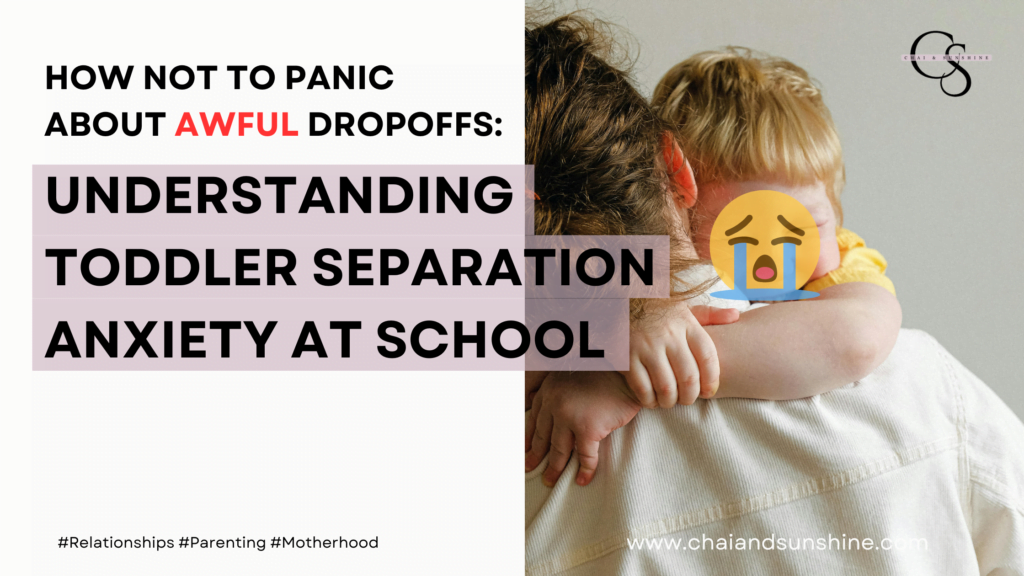
Like many parents, hubby and I were looking forward to the start of the new school year. The girls would be away from Monday to Friday, doing fun, stimulating things, and eating a wider variety of foods. (Our toddlers had regressed to a diet of French fries and sparkling water after an indulgent summer with their grandparents). We even imagined that after a month of lax structures and endless adventure (including a flight back to the UK), that our girls might actually welcome the stability that came with a back-to-school routine. Man, were we in for a rude awakening! Our drop-offs were so dramatic and horrible that I often ended up crying. Sometimes in the car, while hubby stared out into the void, shell-shocked in his own right. A couple of times in the reception area in full view of other horrified parents. But here we are, 3 weeks of morning dread later. But thankfully, it wasn’t all for nothing. I’ve got a few sage words for ye struggling parents facing toddler separation anxiety at school. So, in this post, I’ll be covering: Tips on how to handle their emotions, How to handle your feelings, and How to decide whether there is something more worrying going on But first, a note – Toddler Separation Anxiety at School: Adjusting Expectations We put our girls in nursery for the first time last year, a month before their second birthday. The school had a gradual, week-long adaptation process. And by the end of that week, our girls were at school for the full day (~9:00 – 17:30). During that year, there were a few tearful goodbyes here and there, but there were also many confident they-didn’t-even-look-back drop-offs. And when it came to this year, herein was our first mistake. Expecting that they would pick up where they left off. Here are a few of our false assumptions: Past Performance is NOT a Prediction of Future Performance They were fine at the end of last year. They will be fine picking up where they left off. The holidays may not affect your little one’s return to school if you’re lucky. But they can also be a major reset in terms of their expectations for how they think their day is about to go. This is especially true if you spent the entire holiday together, doing fun stuff. Suddenly going back to school may be a shock to the system. Separation anxiety is only for younger kids. While many parenting sites talk about separation anxiety as a phase that most kids go through around 8 months of age, toddler separation anxiety at school is also extremely common. It is also not a developmental failure of the parents. As the toddler matures, they should also be more emotional independence. While toddler development may be happening leaps and bounds both physically and with their language, they are also becoming more emotionally aware. This means that everything hits them harder (think of the tantrums), including goodbyes. If they’re in the hands of good caregivers who can help them regulate emotionally afterwards, they should calm down within a few minutes. Toddler Separation Anxiety at School: A Decision Tree When we dropped our twin toddlers at school, there were a lot of feelings flying around. At drop-offs, they would cry, hold onto us/ our clothes, scream, beg, and even kick/ hit their teachers. And us? Well, I already admitted to being a puddle of tears. But we also felt a lot of guilt and concern around whether we were doing lasting complex trauma-type damage to our children. So, during week 2 when things did not look like they were getting any better, we decided to sit down and map out our options. It looked something like this: The Disaster Drop-off Decision Tree You’re very welcome to use this decision tree to map out your own options with your toddlers, but bear in mind a few things. First, the educators/ caregivers at your school need to be people you trust. If they tell you that your child is doing fine after 10 minutes at the school, you should be able to believe them. If not, and depending on where the mistrust comes from, you’d either get your kid out of that school or work on your trust issues. And second, this decision tree presupposes that you have a good-enough relationship with your toddler. In other words, that they are comfortable enough in your presence to show or tell you about their real emotions. If not, you won’t know whether they are improving or whether they are simply too afraid to tell you they’re not. How to Handle Big Emotions We were told, repeatedly, that our girls were happy less than 10 minutes after drop-off. But that didn’t help us a lot. Our parting memories of leaving them at school for the day were of our children, panicked and tear-stained, begging us not to go. And that can be very tough to process for us adults, even if we know intellectually that they are in good hands. Here’s how to help your toddler feel more safe and calm your own emotions, too. Helping Your Toddler Feel Safe Our biggest mistake, perhaps, was not adequately preparing them for school after the holidays. We somehow did not register the enormity of the change for our twins. In fact, the first couple of days after school, their whole personalities seemed to change. One of them seemed a bit spaced out (not her character at all). While the other seemed to have some strong anger towards us (also unusual). We worked through their confusion, anger, sadness, and more over the week. And things eventually got back to normal. But that was a bit of a shock for us. Now, we let them know in advance that “tomorrow you’ll be going to school”. And that, even though it might be hard at first, they always have lots of fun. (Self-reported fun, we’re not gaslighting them!). We also
How to Stop Being a Perfectionist Parent (and Enjoy Your Kids)
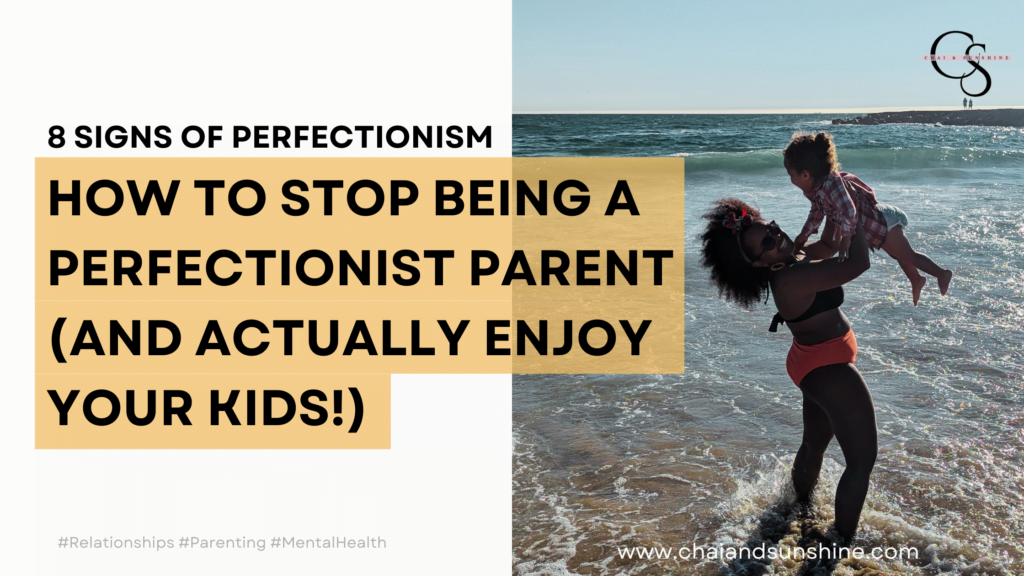
I’m writing this “how to stop being a perfectionist parent” post specifically for my husband, knowing full well that he will likely never read it. The topic came up yesterday. “I feel like we’re failing,” he told me, out of the blue. “The house is always a mess, we never give them proper meals, and they watch too much TV.” “Wow,” I thought. “He sounds just like my inner voice from back when I was depressed.” But thanks to that horrendous PPD experience, I knew exactly what was going on with my otherwise carefree hubby. So, I told him. “You’re being too perfectionistic,” I said. “You’re holding yourself up to unrealistic standards and feeling terrible about a problem that isn’t really there.” He nodded. “I agree,” he said. But I knew it wouldn’t be enough. Because, unfortunately, diagnosing the problem and knowing how to fix it are two different things. So, this post is my way of deciphering how I was able to stop being a perfectionist parent and actually enjoy my kids. Then, I’ll report back to my husband because he’s yet to read a full Chai and Sunshine article. And, in the meantime, I hope it helps you, too. 8 Signs of a Perfectionist Parent Before we dive into how to stop being a perfectionist parent, we need to understand the myriad ways perfectionism can manifest. Only once we understand the common signs of a perfectionist parent can we do something about it. And for anyone in denial or doubt, read these signs out to your spouse, co-parent, or kids. Ask if they recognise these behaviours in you. It might not be pleasant, but it’s the first step in lasting change. Here are 8 signs of a perfectionist parent. Note: these tendencies can be either self-directed (not feeling like a good enough parent) or directed at the child (being hard on them so they can reach your high standards). You might find that it’s a little bit of both. You also don’t need to tick off all 8 signs to make some changes. 1. Unrealistic Expectations Setting unrealistic and often unattainable standards for yourself or your child. Not taking into account the present resources or abilities when setting these goals. 2. Constant Criticism Frequent or constant self-criticism for your perceived parenting shortcomings (or the “shortcomings” of your child). Focusing on your children’s mistakes rather than their accomplishments. 3. Comparing/ Competing with Others When you do set unattainable goals and standards, it’s often image-related or superficial. You may also compare your reality to what you see of other parents and their children. This may leave you feeling inadequate. 4. Fear of Failure/ Excessive Pressure You may have an outsized idea of what the consequences of anything less-than-perfect may result in. For example, “you will never find friends if you’re always looking so scruffy!” You may also have an unhealthy fixation on past mistakes. 5. Over Involvement/ Micromanagement Directing your kids’ or co-parent’s every action. Getting involved in their lives on a granular level. 6. Ignoring Emotional Needs Prioritising achievements and portraying a “perfect” image over the emotional needs of you or your child(ren). 7. Lack of Spontaneity No room for creativity or relaxation. Rigid rules and schedules for you and/or your family dominate your life. (E.g. nap times, dinner times, eating schedules or menus). 8. Living Through the Child Think “Dance Moms” or “Pageant Moms”. Projecting your unfulfilled dreams onto your child(ren). Why It’s NOT Easy to Stop Being a Perfectionist Parent Breaking free from the grip of perfectionist parenting can be really challenging. (It sure was for me!) At its core, it’s deeply rooted in the desire to provide the best possible life for our children. But the fear of making mistakes or falling short can be paralysing. This often results in the very opposite of what we’re trying to achieve, reigniting the cycle of perfectionist control all over again. But what makes perfectionism really hard to get rid of is that it’s often intertwined with our own self-worth. Because perfectionist parents often lack a strong internal compass, they are more susceptible to adopting external standards. This means striving for what society deems as excellent rather than listening to your own needs or those of your child. It may also mean getting caught in a cycle of comparison. We look at other parents and their seemingly perfect children, forgetting that everyone faces challenges behind closed doors. This often stems from various factors, including childhood trauma, complex post-traumatic stress disorder, insecure attachment styles, or underlying issues like undiagnosed OCD or other anxiety-related conditions. Breaking free requires awareness and a shift in perspective. It means learning to build authentic relationships with yourself and your children, rather than relating to yourself and them solely through achievements. How to Stop Being a Perfectionist Parent Societal pressures to achieve, coupled with personal insecurities, often fuel the perfectionist mindset. Additionally, it’s difficult to let go of the illusion of control. As parents, we crave the ability to shape our children’s futures, and perfectionism can feel like a way to exert that control. The first step to overcoming these perfectionist tendencies is therefore self-awareness. Keep a diary of your thoughts and behaviours, paying close attention to all-or-nothing thinking and catastrophising tendencies. Like when my husband said that we were “failing” because “the house is always a mess” and “we never give them proper meals”. These cognitive distortions often magnify the consequences of imperfections. Along with this self-awareness, I recommend practicing deep curiosity about the roots of your perfectionism. Does your perfectionist inner voice sound uncomfortably similar to that of a critical caregiver? Or maybe by aiming for perfection you’re subconsciously seeking validation from an absent or emotionally distant caregiver. Understanding these underlying drivers is crucial for breaking free from the perfectionist cycle. Therapy can be an invaluable tool in this process. A trained therapist can provide guidance, support, and strategies for managing perfectionistic tendencies. By working through past experiences and developing healthy coping mechanisms, you can gradually release the grip of perfectionism
In Defence of Gentle Parenting (and Why it’s Not Working for You)
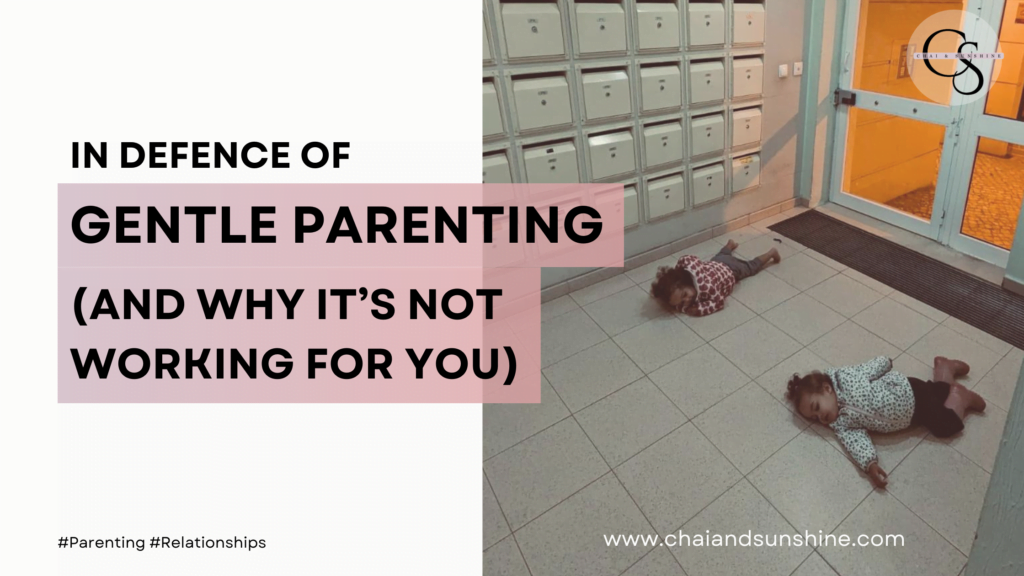
Gentle parenting. It’s what my generation of parents – the millennials – have turned to as the gold standard. But for some reason, it’s controversial amoung childless boomers like talk show host Bill Maher, who spent 10 minutes calling for the return of “trad dads” and comparing parenting to blow jobs. Yuck. But these insensitive boomer mofos are the exact reason why we’re all in therapy. So, in defence of gentle parenting, here’s my take on why it might not be “working” for some of you. What is Gentle Parenting? Gentle parenting is focused on building a strong, loving connection with your child while setting clear, consistent boundaries. It’s about responding to your child’s emotions with empathy, patience, and respect. Instead of relying on punishment or rewards, gentle parenting emphasises positive discipline, co-operation, and problem-solving. Can you imagine: a child with strong inherent self-worth? It’s creating a safe space for your child to learn, grow, and develop into a confident, compassionate individual. And also about creating a safe enough space for your children to come to you in times of trouble. Essentially, gentle parenting is about treating your child with the same respect and understanding you’d hope to receive. What’s so controversial about that? Principles and Characteristics of Gentle Parenting (with Examples) Now, the only reason I imagine people not agreeing with gentle parenting is because they didn’t have gentle parents themselves. And their inner critic wants to make sure everyone else gets the same harsh treatment they received. Here are some principles and characteristics of what gentle parenting means on a practical level. 1. Your Child is their Own Person Perhaps the most important principle for me: realsing your child is their own person with their own feelings, thoughts, and ideas. They are not merely an under-developed human waiting to be moulded by you into your ideal version of what a child is to be. Respecting this, and respecting their interests and feelings is paramount to raising healthy human beings. 2. Emotional Validation Understanding and validating your child’s feelings is so key. Instead of dismissing emotions like anger or frustration, gentle parenting means parents listen actively and offer comfort. For example, if a child is upset, even if you don’t think it’s logical, a gentle parent might say, “I can see you’re really disappointed. It’s okay to feel that way.” We also offer regulating hugs to our twins to help them manage their big feelings. 3. Respectful Communication Treating your child with respect, even when they’re challenging, sets your kid up to trust you, have a strong sense of worth, and be respectful all at once. This involves using kind and respectful language, explaining reasons behind decisions, and inviting your child to share their perspective. For example, instead of yelling, “Stop it!” (or worse), a gentle parent might calmly say, “I understand you’re angry, but we don’t throw toys around the house because they might break things. When things get broken, mommy and daddy feel sad.” Above: The twins, happy in the sand | Right: In bed with the twins for a morning snuggle 4. Clear, Consistent Boundaries While gentle parenting emphasises connection, it also recognises the importance of limits. Age-appropriate boundaries are set with firmness and kindness, explaining expectations and consequences clearly. For example, if a child is hitting, a gentle parent might say, “Hitting hurts. We use our words to express anger. We don’t hit.” Boundaries are some of the best things we can impart to our kids. Too few (permissive) can lead to a person with narcissistic personality disorder and traits. Too many and too harsh (authoritarian) is associated with many issues too. 5. Age-Appropriate Autonomy Empowering your child to make choices and solve problems builds confidence and resilience. Gentle parenting encourages autonomy while providing support and guidance. For example, when faced with a decision, a gentle parent might offer options and help weigh the pros and cons. Gentle parents aren’t helicopter parents. Nor do they prescribe or direct. They build their children’s self-esteem by allowing them to experiment and figure things out. 6. Positive Reinforcements and (Mostly Natural) Consequences Gentle parenting focuses on rewarding positive behavior and allowing natural consequences to teach valuable lessons. Instead of relying on punishment, parents use praise, encouragement, and logical consequences. For instance, if a child doesn’t pick up their toys, a natural consequence might be the inability to find a specific toy when they want to play with it. Of course, there are times when parents need to add consequences because the natural consequence may not be enough to deter the young one. But if you’ve built enough trust, we’ve found that you simply have to explain why you do/ don’t do something and your children (even as young as 2) will believe you and refrain from the offending behaviour. Why Gentle Parenting isn’t “Working” for You People (parents and onlookers) are often frustrated that gentle parenting does not yield quick results. And it’s tempting to be less gentle when your little one is having a meltdown at the restaurant. But gentle parenting is NOT merely a quick fix or a set of techniques to manipulate children into behaving perfectly. It’s a philosophy rooted in respect, empathy, and building a strong parent-child bond. Seeing gentle parenting as a tool to control outcomes rather than a foundation for a healthy relationship is the opposite of gentle parenting. It is just another form of manipulation and control. If you’re pretending to gentle parent in order to get the child to do what you want, you’ve missed the core idea: that children are individuals with their own personalities and needs, not projects to be moulded. True transformation occurs over time as children develop a strong sense of self, security, and autonomy within a loving, consistent environment. (Hint: it’s the things a lot of us have to go to therapy in adulthood to try to mend). The “results” of gentle parenting are embedded in a child’s character, their ability to form healthy relationships,
Travelling with Twin Toddlers: 7 Tips We Learned The Hard Way
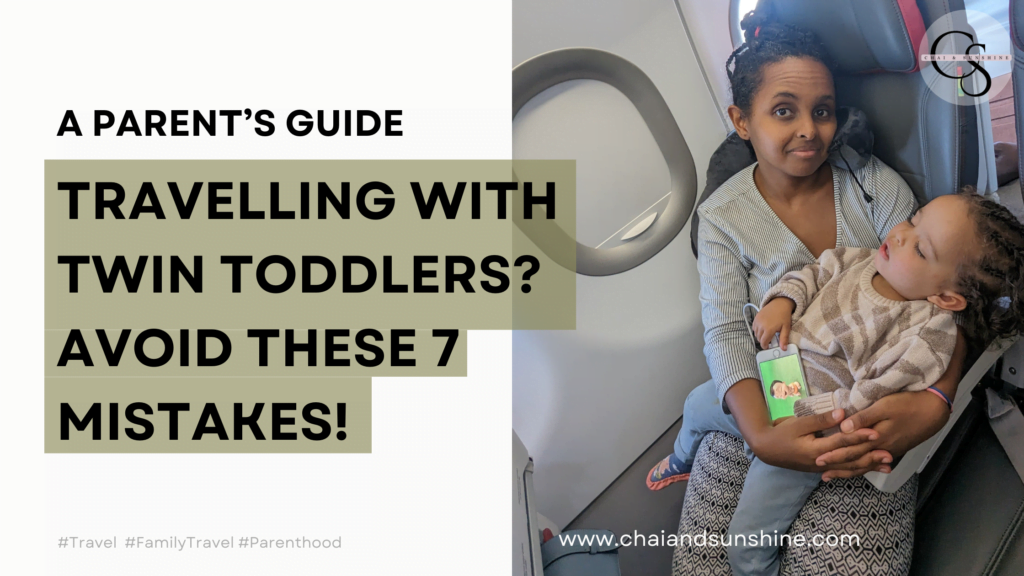
Travelling with twin toddlers is not easy. But there are ways to lessen the pain! Here are 7 toddler travel tips we learned the hard way.
Postpartum Depression: My 14-Month Battle & What Finally Helped
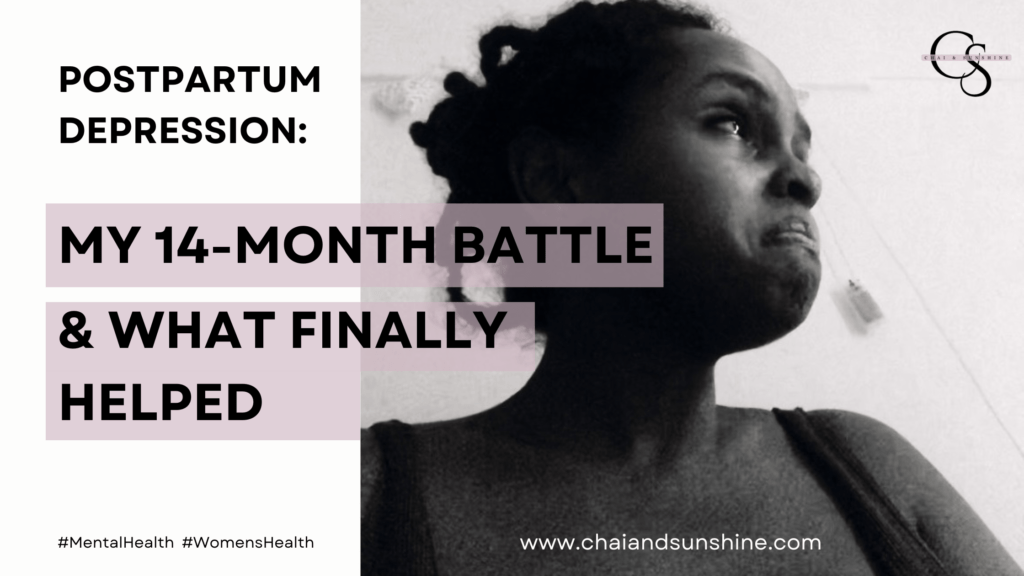
Postpartum Depression: My 14-Month Battle & What Finally Helped Ever stare bleary-eyed at your beautiful newborns, an existential dread twisting in your gut? And felt that, no matter what you tried, the hopelessness wouldn’t budge? Did you ever wonder whether you were experiencing postpartum depression (PPD) or were just an unfit parent who had made a colossal mistake by bringing life into the world? That was me, Haimi, a new mom of twins. Here’s the thing: I knew depression before pregnancy, but I always managed to climb out of the hole eventually. This time, though, with double the trouble in the cutest possible form, it felt different. The exhaustion was one thing, but the crushing anxiety and bottomless sadness – that was new. Months blurred together in a haze of feedings, diaper changes, and a constant, nagging question: would I ever feel joy again? I genuinely didn’t know if I could go on for much longer. Often, I’d ask myself: is this PPD? I didn’t meet all of the criteria, so I struggled to see myself in what was being written. And because of that, I didn’t get help for a long time. But there is hope if we all talk to each other. And that’s why I’m sharing my story, along with the questions I grappled with, so you don’t have to walk this path alone. Let’s break down the confusion and fear surrounding PPD, one question at a time. What is Postpartum Depression? (And What Isn’t?) The Oxford dictionary likes to define postpartum depression as depression suffered by a mother following childbirth, typically arising from the combination of hormonal changes, psychological adjustment to motherhood, and fatigue; postnatal depression. I suppose that’s an accurate, clear, and perhaps even comprehensive explanation. After all, one can pack a lot of symptoms into “depression”. But I like to think of PPD in slightly less clinical terms (just because none of it felt clinical to me). PPD is a complex emotional and hormonal shift that can sometimes occur after childbirth, extending beyond the temporary “baby blues” some new moms experience (that have more to do with the changes from the birthing process rather than a longer term of depression). What Does Postpartum Depression Feel Like? If you’re struggling with PPD, you might find yourself feeling a persistent sense of sadness, anxiety, or emptiness, even amidst the joy of having a newborn. Daily tasks can become overwhelming, and sometimes basic self-care feels impossible (even when you have a rare moment for that shower). You may experience difficulty bonding with your baby or find yourself consumed by worry and guilt about your parenting abilities. You may feel regret at having had a child at all, or feel stuck with the weight of your choice to do so (if it was a choice at all). It’s not a one-size-fits-all kind of affliction. Seeing it as a box-ticking exercise of symptoms, rather than taking into account the holistic well-being of the mother has the secondary effect of alienating vulnerable women and leaving a lot of them without the help they need. Complete this survey to see if you have the symptoms by completing the Edinburgh Postnatal Depression Scale (EPDS) here. 3 days postpartum Is It Postpartum Depression or the “Baby Blues”? So, what’s the difference between PPD and the so-called “baby blues”? The length and severity. The baby blues usually come on quickly after birth, make you tired, teary, and tense for a couple of weeks, and then you’re good to go. It also generally does not affect your parenting or adulting abilities. You’re able to reasonably care for yourself and your offspring. PPD, on the other hand, can start at any point after birth and can last for any amount of time thereafter. The symptoms are often more profound and entrenched. Think: fearfulness, helplessness, hopelessness, regret, guilt, and despair. Another way I like to think of it is that the baby blues are about physical and chemical changes. Exhaustion, hormonal changes due to birth and breastfeeding, a new routine, etc. The body takes some time to adjust to this, and the crying and mood swings are a natural result. PPD has deeper roots. Sure, physical and hormonal changes have a big role to play. But I believe that PPD has a lot to do with our mental make up from before we were pregnant. Things like lifelong perfectionistic tendencies, coming from a dysfunctional family system, or being fiercely independent can set us up for the big PPD. Also, if you’ve suffered with bouts of regular-degular depression, or other disorders like bipolar disorder, before getting pregnant, you are at a higher risk of getting PPD after childbirth. A Useful Analogy Think of the difference between the baby blues and postpartum depression this way: Let’s say you’re on a beach and decide to go for a swim. The baby blues would be like a wave – maybe a large one – that hits you, maybe knocks you on your butt, and drags you along the sand a little. Not long after, it recedes back into the ocean, and you’re able to pick yourself up and head back to the shore. You might have a bruise or scrape, and you might be a little stunned, but you otherwise make it out unscathed. PPD would be if you decided to go out to swim in the sea, get sucked far out into the open ocean by a riptide, and you struggle for dear life to get back to shore. Because PPD, like riptides, can be deadly if help is not found quickly. It’s an experience that profoundly changes your relationship to life and something that’ll take a while to process. Can I Still Have Postpartum Depression if I’m Happy Sometimes? Yes! Experiencing moments of joy, even happy moments while parenting, would not overrule a diagnosis of PPD. If you otherwise are hampered by an overwhelming sense of hopelessness, loss, regret, guilt, or shame, PPD may still apply. I had many joyful moments with my beautiful twin girls,
Parenting is Hard: 16 Funny Quotes to Keep You Sane
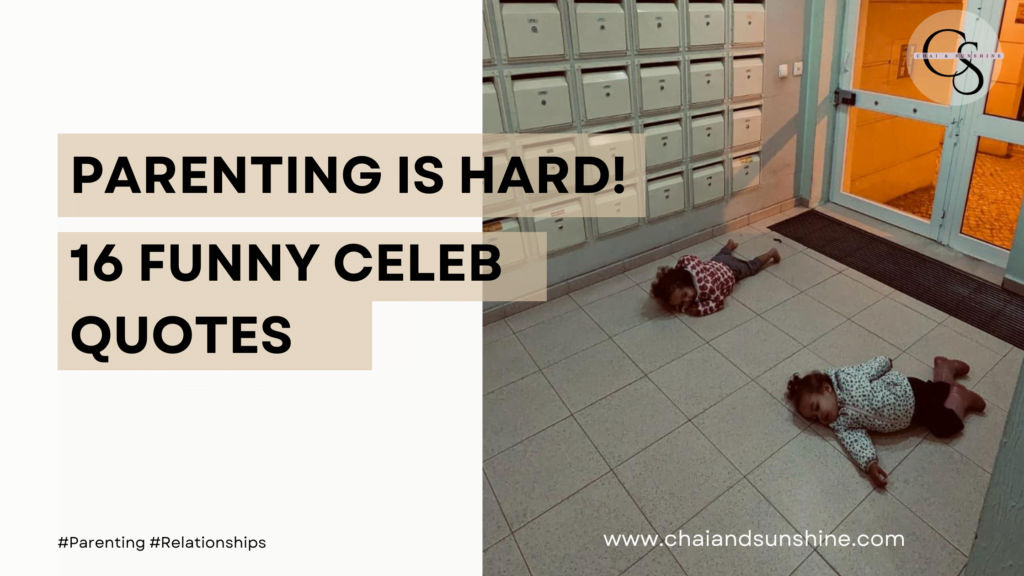
Stressed out from parenting? Of course you are! Parenting is hard! Lighten your mood with these funny quotes from real people that remind us it’s okay to laugh amidst the challenges.
